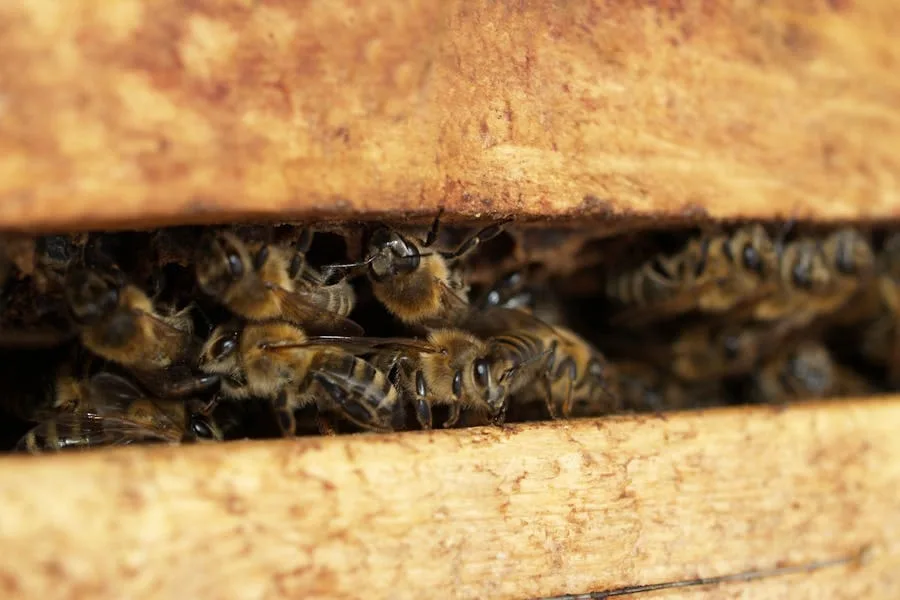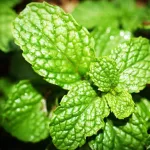Bees have long held a place of significance in various cultures around the world, including within the Judeo-Christian tradition.
When it comes to finding bees in one’s house, interpretations vary, but there’s a rich tapestry of meanings that can be gleaned from religious and spiritual texts.
In the Bible, bees and swarms are referenced in several books, often symbolizing attributes such as industriousness, warfare, and divine intervention.
From a spiritual perspective, bees are commonly associated with prosperity, teamwork, and resourcefulness.
Their presence in a home might be viewed as a harbinger of good fortune, signaling hope, new beginnings, or even a time for abundance.
Contrarily, the biblical context sometimes casts bees as metaphors for challenges or impending danger, as seen when armies are likened to swarms of bees to portray a sense of threat or battle.
Such dual symbolism reflects the multifaceted role bees play within biblical literature, from representing the virtues of hard work and perseverance to serving as omens for the trials one might face.
Thus, the encounter with bees in domestic spaces is open to interpretation, guided by the rich spiritual and cultural histories that perceive these creatures as both bearers of blessings and heralds of caution.
Read too: The Spiritual Meaning Of Bees In Your House (Symbolism)
Biblical Significance of Bees
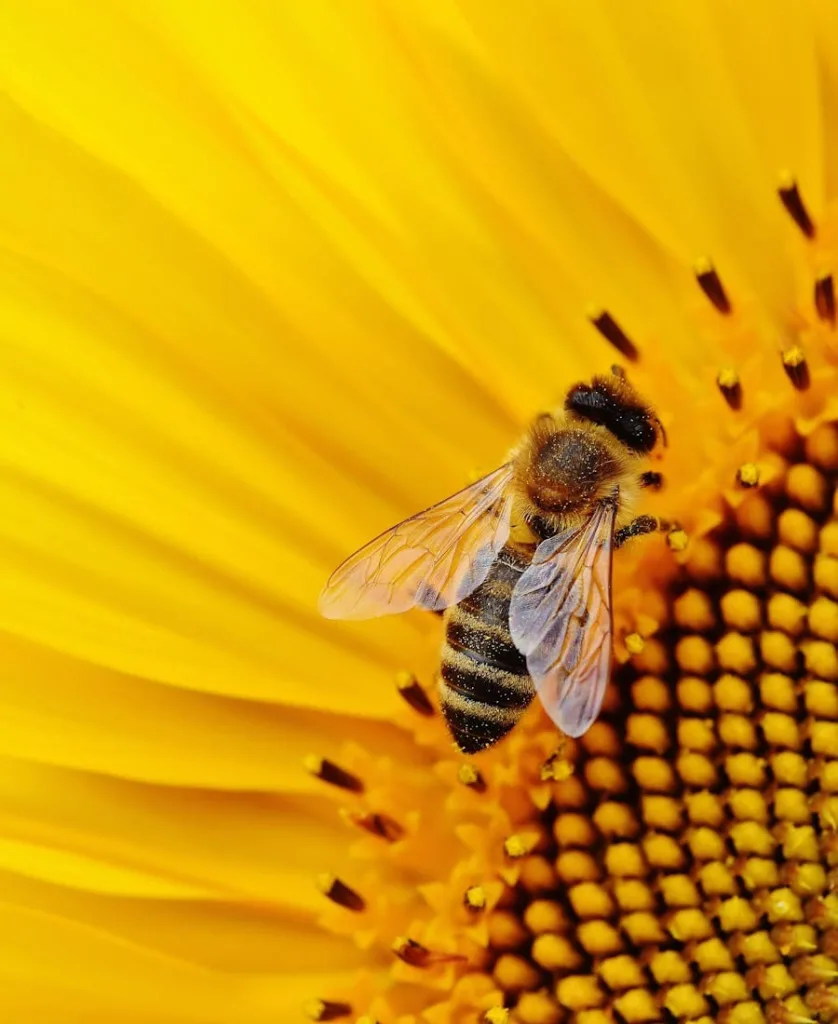
The bees hold multifaceted significance in biblical texts, symbolizing hard work and wisdom, while also featuring in parables and lessons that convey deeper spiritual meanings.
Bees in Scripture
In the Bible, bees are frequently alluded to but are rarely the central subject.
Deuteronomy 1:44 references bees metaphorically, illustrating how the Amorites chased the Israelites as relentlessly as bees, highlighting bees’ perceived aggression and persistence.
This allusion gives insight into how bees were regarded in biblical times: persistent and industrious creatures.
Lessons from Bees
The spiritual lessons drawn from bees in the Bible often revolve around their characteristic diligence and productivity.
They exemplify the virtues of industriousness within a community and are seen as a model for humans in their effort to gather sustenance and build well-ordered societies.
The honey they produce is sometimes likened to the Word of God—sweet to the soul and representing nourishment for the spirit.
Samson’s Riddle
One of the most famous narratives involving bees in the Bible is found in Judges 14.
Here, a riddle posed by Samson features bees that have created honey within the carcass of a lion, which Samson had slain.
This story juxtaposes might and gentleness, death and life, and utilizes the bee to symbolize unexpected sweetness and sustenance coming from strength and ferocity.
Land of Milk and Honey
Referenced numerous times throughout the Bible, the phrase “a land flowing with milk and honey” signifies abundance and prosperity, with honey symbolizing the utmost in sweetness and reward.
The promise of such a land to the Israelites is not only indicative of material prosperity but also resonates with spiritual abundance and the richness of living in accord with divine guidance.
Spiritual Interpretation of Bees
Bees have historically been regarded as symbols imbued with spiritual significance, and their presence in one’s home can carry a deeper, otherworldly message.
The interpretations often center on bees’ roles in connection with the soul, divine communication, and prophetic dreams.
Bees and the Soul
Bees are sometimes viewed as a reflection of the soul’s journey towards wisdom and enlightenment.
Their tireless work ethic and dedication to the hive can symbolize the quest for spiritual growth and the soul’s pursuit of a higher purpose.
Additionally, the communal life of bees may resonate with the idea of unity in spirituality, suggesting a harmonious connection between the individual soul and the collective heavens.
Bees as Divine Messengers
The perspective of bees as divine messengers is grounded in their historical association with providence.
Their appearance is often interpreted as an intentional act by a higher power to convey messages of guidance or forewarning.
These messages may inspire individuals to consider their paths and the unity of their community, reflecting heaven’s order and purpose.
Dreams and Visions
Encountering bees in dreams or visions can be interpreted as a spiritual encounter with deeper significance.
Such dreams might represent the divine message of wisdom and the push towards self-realization.
The intricate dance of bees as they communicate their findings can be symbolic of the complex patterns of fate and providence, with the dreamer encouraged to seek understanding and insight from these celestial guides.
If you are enjoying reading this, you will definitely enjoy reading 11 Spiritual Meaning Of Bee Sting (Good Or Bad?)
Symbolism and Metaphors
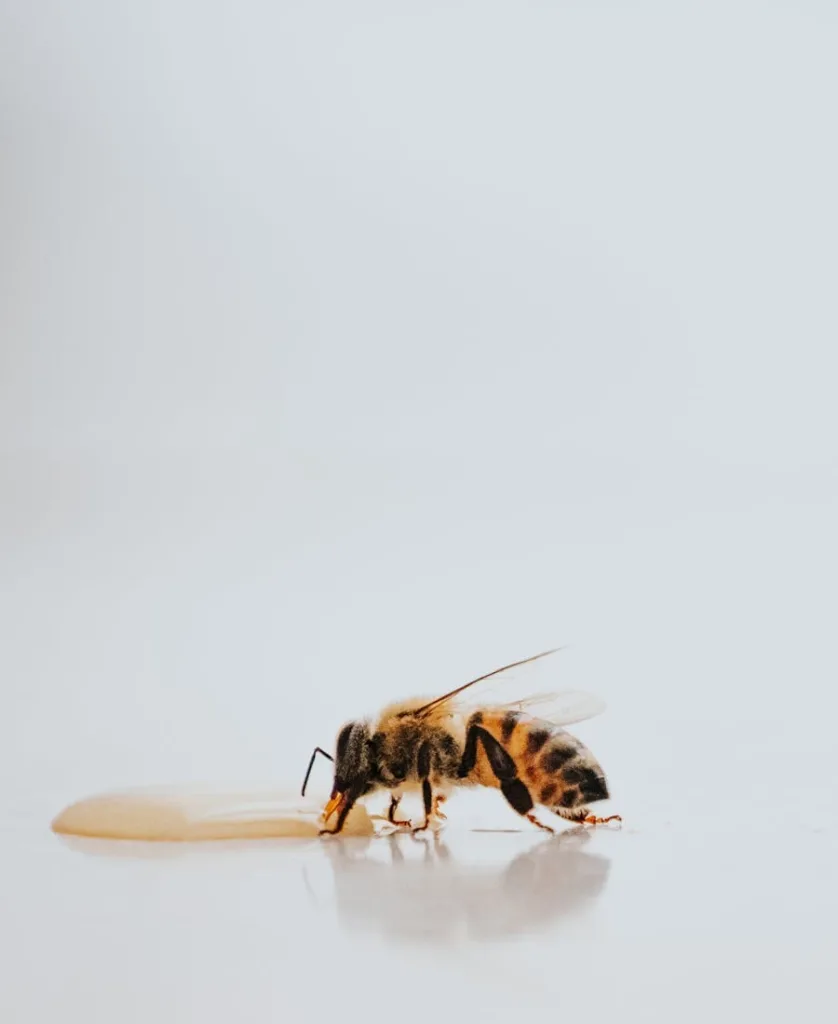
In exploring the symbolism of bees, one can connect this tiny, industrious creature to profound spiritual concepts.
The presence of bees in the home carries rich metaphorical meanings in various cultural and religious contexts, many of which have been noted in biblical references.
Bees as Symbols of Abundance
Honey bees are often seen as symbols of abundance and prosperity. Biblically, the land flowing with milk and honey represents plentifulness and God’s promise of nourishment.
Their role as pollinators directly correlates with the abundance and health of crops, making them an emblem of a fruitful God’s provision.
Bees and Hard Work
In the realm of diligence, bees are emblematic. They embody hard work and tireless effort.
The biblical portrayals of bees echo the virtues of industriousness, with their constant labor and productivity serving as a reminder of the rewards of diligent efforts.
Bees Representing Wisdom
The symbolism of bees also extends to wisdom. Their structured social system and the intricate construction of hives reflect wise labor and organization.
Similarly, the production of honey—a substance that has long shelf life and medicinal properties—symbolizes not only the sweetness of God’s grace but the wisdom in God’s creation and providence.
The Role of Bees in the Natural World
Bees play an essential role in ecosystems, acting as pollinators, enhancing fertility, and supporting the nourishment of various plant species while fostering a protective community.
Bees as Pollinators
Bees are key pollinators in many ecosystems, facilitating the reproduction of flowering plants.
They transfer pollen from the male structures of a flower (the stamens) to the female structures (the pistils) of another of the same species.
This pollination process is critical for the production of fruits, vegetables, and nuts, underpinning the diversity of the planet’s flora and thereby the health and sustenance of countless other species.
- Contribution to Fertility: The pollination work of bees contributes significantly to the fertility of the natural world, helping maintain biodiversity and abundant plant life.
- Impact on Ecosystems: As they move from flower to flower, bees perform a vital function that is necessary for the survival of many ecosystems. Many plants depend exclusively on bees to achieve pollination.
Protection and Community
Bees not only nurture the environment through pollination but also play a protective role in their way of life.
- Nourishment: Bees collect nectar and pollen, which not only nourish the colony but also result in the production of honey, a natural preservative and food source for many species, including humans.
- Community Structure: Bee colonies are characterized by a sophisticated level of social organization.
They display a strong sense of community and protection, building complex hives that safeguard their members and ensure the survival of the colony against environmental challenges.
This structure is essential in maintaining their populations and, by extension, the ecosystems they support.
By performing these roles, bees remain an integral component of the natural world, confirming the necessity of their protection and conservation.
Before you leave, read Spiritual Meaning Of A Beetle Landing On You (Is It Good?)
Contemporary Applications
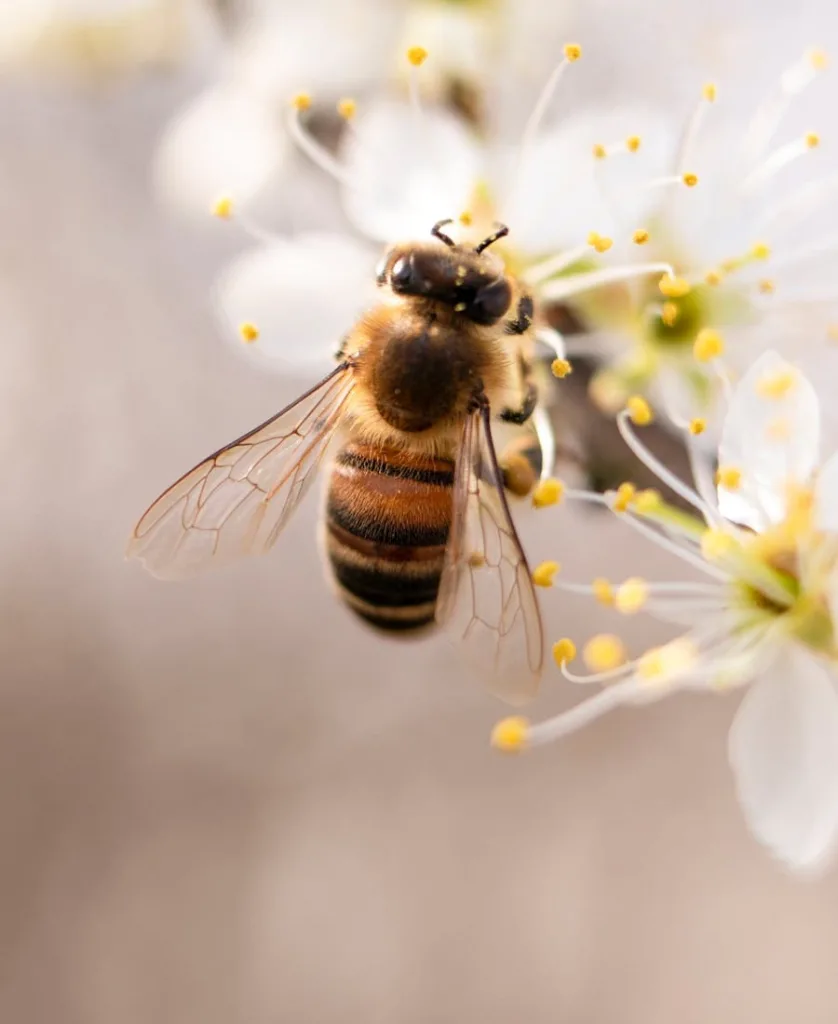
In interpreting the biblical significance of bees within a home, individuals and organizations can draw valuable lessons on personal growth and organizational behavior, making these ancient symbols relevant in a modern context.
Personal Growth
They can see the bee as both a model of industry and as a reminder to focus on their personal goals.
The diligence of bees emphasizes the virtue of hard work, suggesting that persistent effort is key to personal development.
People might translate the presence of bees as an encouragement from the divine to pursue their goals with steadfastness and resilience, much like the bee’s unwavering commitment to its tasks.
- Lessons: Embrace industriousness for self-improvement.
- Productivity: Improve personal efficiency by emulating the bee’s work ethic.
- Strength: Cultivate inner strength to face challenges.
Organizational Lessons
Organizations can glean insights from bees about effective teamwork and community building.
Bees operate within highly sophisticated and cooperative societies, which serve as excellent examples for fostering a sense of teamwork and a strong community in the workplace.
- Teamwork: Encourage collaboration to achieve common goals, as bees do within the hive.
- Community: Build strong relationships akin to the interconnectedness of a bee community.
- Hard Worker Ethic: Promote a culture where each member’s contributions are valued and diligence is recognized.
They translate these natural inclinations of bees into organizational strategies to enhance productivity and ensure a cohesive, industrious environment.

